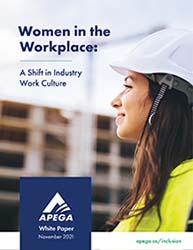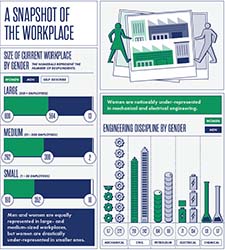Training
APEGA provides equity, diversity, and inclusion training with the goal of encouraging a business culture of belonging, inclusion, and diversity, and addressing the top barriers women and other underrepresented groups face in engineering and geoscience.
With support from the Women's Economic Recovery Challenge grant, we are developing training modules and asynchronous training options for our membership. In the meantime, you can contact us to set up a synchronous training session facilitated by our Equity, Diversity, & Inclusion (EDI) Team.
Sessions are usually scheduled for 1.5 hours; however, we can accommodate other session length requirements based on each group's needs.
Session Options Available for Membership
-
Session Overview
This session explores the concepts of microaggressions and microaffirmations, the impact they have in our interpersonal interactions, and what actions individuals can take as bystanders.
Session Learning Objectives
As a result of attending this session, participants will be able to:
- identify different types of microaggressions.
- explore different microaffirmations.
- identify actions towards combating microaggressions.
- practise calling in and calling out.
-
Session Overview
Attracting and retaining top talent begins with opportunity. Traditional hiring practices can create barriers to meaningful participation of women and other members of under-represented groups in the workforce. This session illustrates how organizations and hiring managers can implement inclusive, competency-based hiring practices to help remove barriers to opportunity and increase access to top talent and a more diverse and representative applicant pool.
Session Learning Objectives
As a result of attending this session, participants will be able to:
- reflect on advantages and drawbacks of different applicant evaluation methods.
- identify key areas to ensure fairness and objectivity at each stage of the applicant recruitment journey.
- examine biases that come into play in evaluation and hiring decisions.
- identify ways to interrupt these biases and limit them from becoming embedded into organizational processes, procedures, and policies.
-
Session Overview
This session introduces participants to the concepts of equity, diversity, and inclusion and how they manifest in engineering and geoscience contexts.
Session Learning Objectives
As a result of attending this session, participants will be able to:
- explore different diversity dimensions.
- differentiate between equality and equity.
- identify tactics towards fostering inclusion.
- reflect on barriers to inclusion in their own contexts.
-
Session Overview
This session illustrates how unconscious bias impacts our interpersonal interactions and presents tactics to actively and consciously control these biases.
Session Learning Objectives
As a result of attending this session, participants will be able to:
- reflect on different types of unconscious bias.
- examine unconscious bias impacts in professional contexts.
- identify actions towards building conscious inclusion.
-
Session Overview
This session explores how to navigate and manage leaves of absence by applying inclusive practices to different leave scenarios that occur in the workplace (e.g., maternity/parental leave and medical leave). These leading practices are outlined in the document Managing Transitions: Before, During, and After Leave, released by Engineers Canada and Geoscientists Canada.
Session Learning Objectives
As a result of attending this session, participants will be able to:
- understand the organizational business case and impact from implementing inclusive practices surrounding leaves of absence.
- identify leading practices for individuals, leaders, HR professionals, and organizations for different types of leaves:
- Individuals will learn what proactive steps and actions to take before, during, and after leave.
- Leaders will learn how to go above and beyond what basic legislation requires to encourage continued individual success and promote an inclusive workplace.
- Organizations and HR professionals will learn how to build an environment of inclusion and belonging, while maintaining business continuity.
- reflect on various ways in which individuals, leaders, and organizations can practise inclusivity through leaves of absence, within their own workplace context.
-
Session Overview
At this session, we will provide an overview of the history of APEGA’s 30-by-30 goal, review where representation of women in the professions currently sits, and discuss how we are working towards achieving this goal. The presentation will focus on findings and final recommendations from APEGA’s Women in the Workplace report (2021) as well as APEGA’s current research on barriers that were introduced or aggravated by the pandemic.
Session Learning Objectives
As a result of attending this session, participants will be able to:
- understand the history of APEGA’s 30-by-30 goal and the work APEGA’s Equity, Diversity, and Inclusion (EDI) team is doing to support the advancement of women in the professions.
- identify leading practices that individuals, leaders, and organizations can undertake to remove the barriers that women experience and shift engineering and geoscience workplaces to be more welcoming to women and other under-represented groups.
-
Session Overview
Inclusive leadership starts with you, whether you are in a formal executive/director role, a manager/supervisor position, or simply collaborating with others to achieve a common goal. These individuals build the framework for belonging and inclusivity within their teams to pave the path for innovation and growth. This session will provide an overview of what inclusive leadership looks like and will highlight the significance of inclusive teams for building equity within the engineering and geoscience professions.
Session Learning Objectives
As a result of attending this session, participants will be able to:
- understand the business case for fostering inclusive environments.
- identify and know how to apply the core traits of inclusive leadership.
- examine the roles that leaders and individuals play within an inclusive team setting.
- reflect on how leaders and individuals, together, can apply inclusive practices within their own team and in organizational contexts to create a sense of individual belonging for all.
Upcoming Sessions
-
SESSION FULL Central Alberta Branch | Women in the Professions: Golf Lessons & Networking
This event is an opportunity for women and allies in support of APEGA's 30-by-30 initiative to come together, share experiences, and discuss opportunities and ideas to help advance women in the professions over a set of friendly golf lessons.
Resources
In 2021, APEGA concluded a research project on the barriers that women face in the engineering and geoscience workplaces.
Parental & Maternity Leave
Managing Transitions: Before, During and After Leave. This is a resource guide with extensive checklists that outline steps that individuals, supervisors, and companies can take to smoothly off- and on-ramp employees taking a leave of absence, such as maternity or parental leave.
On-Ramping Guide for Employers, a guide for Alberta STEM companies welcoming employees back into the workforce after an extended leave.
Measurement & Benchmarking Tools
The National Diversity and Inclusion Benchmarking Study captures Canadian data on D&I practices and the working relationships between senior leaders and their managers.
Unconscious Bias & Conscious Inclusion
Getting Real About Inclusive Leadership: Why Change Starts with You. This report examines how leaders can build inclusive workplaces, particularly focusing on women in the workplace.
High Potential Employees in the Pipeline. This report suggests how Canadian organizations can maximize top talent in their leadership pipeline by maximizing the talent pool.
Take the Online Project Implicit Tests to understand biases (thoughts and feelings outside of conscious awareness and control) you may hold.
The Six Signature Traits of Inclusive Leadership reports on inclusive leadership characteristics to thrive in a diverse world.
Inclusive Policies & Procedures
Changing the Culture for Engineering Employers is a document produced by the Engineers Canada 30-by-30 network to increase diversity and women's participation in engineering organizations.
Improving Gender Balance in the Workforce is a report with concrete actions that can be taken to improve the gender balance of the workforce.
List of Diverse Recruiting Tools is a compilation of technological tools that help with blind résumé review and performance-based hiring.
Toolkit to Make the Business Case for D&I is a report on how organizations can build the case for D&I in their organization.
Take Action for Diversity from the Canadian mining industry highlights actionable steps to increase diversity in an industry.
Aligned Organizations
The following organizations share APEGA’s commitment to equity, diversity, and inclusion and provide professional development and networking opportunities for APEGA members.


